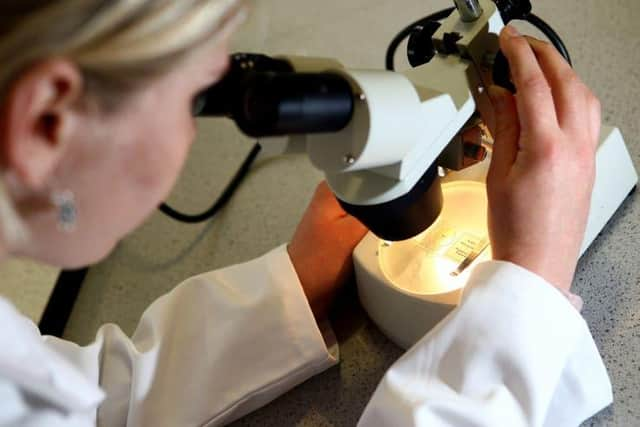More than 1,000 cancers discovered at most deadly stage in Notts
This article contains affiliate links. We may earn a small commission on items purchased through this article, but that does not affect our editorial judgement.
and live on Freeview channel 276
A ‘cancer catastrophe’ could be on the cards if more is not done to reduce the number of people receiving late diagnoses, according to charity Cancer Research UK.
Tens of thousands of cancer cases reached the most severe stage of illness before being detected across England in 2019 – the most recent figures available from NHS Digital.
Advertisement
Hide AdAdvertisement
Hide AdAt least 1,084 cases diagnosed by medics in the NHS Nottinghamshire clinical commissioning group area had reached an advanced stage at the point of diagnosis that year.


Cancer Research UK said there are concerns survival rates could ‘go backwards’ as a result of the coronavirus pandemic's impact on the NHS.
Before cancer patients embark upon treatment, doctors commonly use staging techniques to establish how severe the disease is.
The stages, which range in severity from zero to four, are used to describe the size of tumours and to determine how far the cancer has spread from where it originated.
Advertisement
Hide AdAdvertisement
Hide AdThere were 5,972 cancers diagnosed in Nottinghamshire in 2019 and stage four diagnoses, which carry the greatest mortality risk, represented 31 per cent of those with a valid stage identified.
That was up from the 28 per cent recorded the year before.
Figures for CCGs across England show some cancers are far more likely to be diagnosed late than others, with those affecting the pancreas, lungs and oesophagus among those the most likely to be detected at an advanced stage – often because they do not cause symptoms until a later stage.
Awareness day
They are among those represented by the Less Survivable Cancers Taskforce, which launched in 2017.
The taskforce, made up of six different charities, is holding its first awareness day today, January 11, to highlight the importance of early diagnosis in improving survival rates.
In the area covered by the NHS Nottinghamshire CCG, 42 per cent of the 745 lung cancers detected in 2019 were at stage four when found, as were 90 per cent of 173 pancreatic cancers and 33 per cent of 187 oesophageal cases.
Advertisement
Hide AdAdvertisement
Hide AdPatients diagnosed at the earliest stage are between five and 10 times more likely to survive at least five years, compared with those diagnosed at stage four.
Dr Jodie Moffat, Cancer Research UK head of early diagnosis, said reducing the number of people diagnosed with advanced disease was crucial to saving lives and swift action was needed from the Government and NHS.
She said: “Many factors can impact late diagnoses, and Covid has affected many of these, such as how readily people come forward with symptoms, or how long people need to wait for tests.
"Worryingly, waits for a cancer diagnosis and treatment were struggling well before the pandemic hit.
Advertisement
Hide AdAdvertisement
Hide Ad"Chronic shortages in staff and equipment mean cancer waiting times have been missed for years."
An NHS spokeswoman said the service was committed to ensuring 75 per cent of cancers are detected at stage one by 2028, adding that 95 per cent of those diagnosed since March 2020 began treatment within a month.
A Department of Health and Social Care spokesman said cancer diagnosis and treatment is a priority for the Government, adding that £10 billion was being invested in cutting waiting times.
